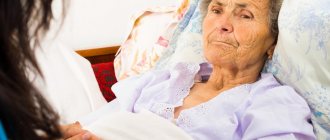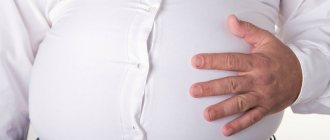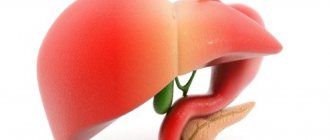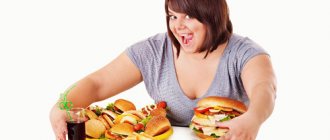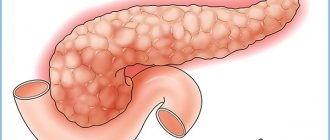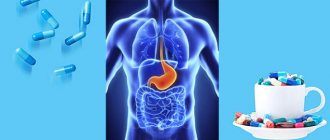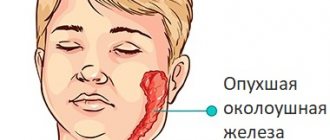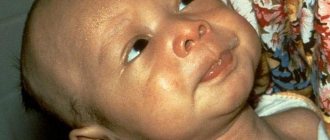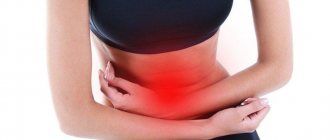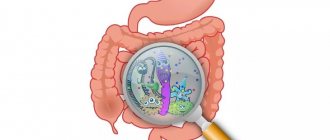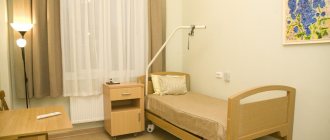Reactive pancreatitis is an acute, aseptic inflammation of the pancreas tissue caused by pathology of other digestive organs (liver, gall bladder, stomach or intestines).
Reactive pancreatitis is an acute, aseptic inflammation of the pancreas tissue caused by pathology of other digestive organs.
A feature of the disease is the rapid improvement of the condition during therapy. The disease code according to the international classification of the 10th revision is K86. Women most often face this problem. This is due to the development of gallstone disease. Reactive hepatitis can be diagnosed in children and adolescents.
Types of reactive pancreatitis
Inflammation of the pancreas occurs in mild or severe form. In the first case, interstitial edema of the organ tissue develops. Gland dysfunction is minimal. This pathology is easy to treat and has a favorable course.
The severe form of pancreatitis is characterized by the development of local complications. Such patients are subject to mandatory hospitalization.
Patients with reactive pancreatitis are subject to mandatory hospitalization.
Depending on the etiological factor, the following types of pancreatitis are distinguished:
- iatrogenic (occurring after surgery);
- toxic;
- traumatic;
- systemic;
- medicinal;
- associated with pathology of the gastrointestinal tract.
Separately, nutritional inflammation is distinguished.
Exacerbation
There are phases of exacerbation and remission.
Exacerbations are the result of a reaction of the gland in response to exposure to unfavorable factors. There may be several of them throughout the year.
Acute course of the disease
The acute form of pancreatitis develops almost immediately after exposure to the etiological factor. The attack can last several hours or even days.
general information
Diseases of the digestive system affect the condition of the pancreas. For example, errors in diet, allergic reactions and organic pathologies disrupt the condition of the organ, leading to its dysfunction and the development of aseptic inflammation.
Reference. Reactive changes in the organ are secondary. In this regard, treatment should also be aimed at eliminating the underlying pathology.
Symptoms and treatment of reactive pancreatitis in adults are related to the causes of its occurrence. These include:
- diseases of the digestive system: cholelithiasis, hepatitis, biliary tract motility disorders;
- traumatic abdominal injuries;
- long-term alcohol abuse;
- a diet with a lot of fatty, salty and smoked foods;
- poisoning with industrial and household poisons;
- improperly performed surgical interventions on the biliary tract.
As a result of these effects, an inflammatory process begins in the pancreatic tissue, which is not associated with a bacterial, viral or fungal infection. Enzymes are released from decaying organ cells that stimulate the progression of inflammation.
Classification of the disease
Depending on the nature of the course and morphological changes in the pancreas, several types of pathology are distinguished.
Based on the extent of organ damage, doctors indicate the following forms of reactive pancreatitis in the diagnosis:
- small focal - small foci of inflammation no more than 5 mm in size;
- macrofocal - inflammatory infiltrate from 5 mm to several cm;
- subtotal-total - inflammation affects the entire parenchyma of the pancreas.
According to the international classification of diseases, reactive pancreatitis has an ICD-10 code K85. It is indicated in the diagnosis to collect medical statistics on population morbidity.
Depending on the severity, the course of the pathology is divided into mild, moderate and severe. This classification is determined by the signs of reactive pancreatitis in a particular patient.
Causes
Excessive consumption of spicy and fatty foods leads to inflammation of the pancreas.
Reactive inflammation of the pancreas is caused by:
- cirrhosis of the liver;
- stones in the gallbladder cavity;
- cholecystitis;
- viral hepatitis;
- chronic gastritis in the acute phase;
- acute and chronic intestinal infections;
- biliary dyskinesia;
- abuse of spicy and fatty foods;
- binge eating;
- poisoning by various poisons;
- food intoxication;
- endoscopic examination of the biliary tract;
- systemic diseases;
- blunt and penetrating abdominal injuries;
- ethanol and decomposition products of this substance;
- taking toxic medications;
- chronic gastroduodenitis;
- performing cholangiopancreatography.
Liver cirrhosis leads to reactive inflammation of the pancreas.
Reactive pancreatitis is based on the early production and activation of pancreatic enzymes (amylase, lipase, trypsin, protease). This leads to their accumulation in the lumen of the organ and tissue damage. A common cause of stagnation of pancreatic juice is cholelithiasis (cholelithiasis).
Stones lead to spasm and irritation of the bile duct and duodenal papilla.
This causes a narrowing (stricture) of the common bile duct, which leads to stagnation of enzymes in the pancreatic duct. The pressure in it increases and the acini (excretory ducts) are damaged.
Etiology
Reactive pancreatitis occurs only in the presence of underlying diseases of the digestive tract. The occurrence of symptoms is provoked by the intake of large volumes of fatty or fried foods, and the intake of alcoholic beverages (especially alcohol substitutes). Smoking and taking medications also predispose to the onset of symptoms of the disease. The following pathologies are the root cause:
| Severe severity (presence of multiple organ failure and/or local complications). | |||
| Stomach diseases: | Diseases of the duodenum: | Gallbladder diseases: | Liver diseases: |
| Stomach ulcer | Duodenal ulcer | Cholelithiasis | Hepatitis |
| Gastritis | Intestinal infection affecting the duodenum (enteritis, colitis) | Cholecystitis | Cirrhosis |
| Stomach injuries | Duodenal injuries | Dyskinesia and akinesia of the biliary tract | Helminthic infestations in the liver |
| Pyloric stenosis | All types of helminthic infestations | Worm infestations | Liver injuries |
Symptoms of reactive pancreatitis
Flatulence is the cause of disruption of the digestion process.
The following symptoms are characteristic of reactive pancreatitis:
- Pain. Feels in the left hypochondrium or epigastric region. With total inflammation of the gland, it becomes encircling. The pain radiates to the shoulder blade or back on the left side. It is constant and intensifies when the person lies on his back. Pain of mild or moderate intensity. It increases after drinking alcohol or fatty foods.
- Flatulence (bloating). The reason is a disruption in the process of digesting food.
- Nausea.
- Transient vomiting. Vomit in reactive inflammation contains pieces of food, mucus and bile. After vomiting, pain may intensify.
- Low-grade body temperature. Observed in severe cases of the disease. It is caused by enzymes entering the bloodstream.
- Pale skin with a jaundiced tint.
- Reduced blood pressure.
- Frequent (above 80 beats/min) heartbeat.
Along with these symptoms, signs of a concomitant disease that has caused reactive inflammation (gastritis, cholelithiasis, hepatitis) may be disturbing.
Observed: cloudy urine, yellowing of the sclera, discoloration of stool, diarrhea, rash, enlarged liver and biliary colic.
Diagnostics
The diagnosis of reactive pancreatitis is made by a doctor based on the results of a survey, physical examination (percussion, palpation, auscultation), laboratory and instrumental studies. You will need:
- cholangiopancreatography;
- Ultrasound of the abdominal organs;
- CT or MRI;
- FEGDS;
- angiography;
- radiography;
- laparoscopy;
- general and biochemical blood tests;
- urine and stool tests;
- determination of specific symptoms (Mayo-Robson, Pasternatsky, peritoneal irritation).
When making a diagnosis, the gastroenterologist must identify possible risk factors and exclude other pathologies.
Ultrasound
With reactive inflammation, ultrasound reveals swelling and enlargement of the gland. Stones may also be found in the gallbladder and ducts.
Tomography
Tomography allows you to thoroughly assess the condition of the tissues of the abdominal organs and accurately determine the size, quantity and location of stones.
Analyzes
A blood test for reactive inflammation of the pancreas reveals an increase in sugar.
A blood test for reactive pancreatitis reveals the following changes:
- increasing the concentration of trypsin and amylase inhibitor;
- increased elastase in the first days of the disease;
- acceleration of ESR;
- increased leukocyte levels;
- decreased calcium;
- increase in sugar.
If the cause is hepatitis or cholecystitis, then an increased level of total bilirubin and liver enzymes is noted.
Urine with reactive inflammation often contains large amounts of amylase.
Treatment
The main aspects of patient therapy are:
- elimination of pancreatic edema;
- prevention of complications;
- elimination of the etiological factor;
- normalization of secretory activity;
- detoxification of the body.
Patients are hospitalized in the gastroenterology department. Rest and temporary abstinence from food are required. In case of acute pain syndrome, blockades can be performed. Applying ice to the projection area of the pancreas helps.
Surgical method
Indications for surgical treatment of reactive inflammation are:
- the presence of stones in the bile ducts or bladder;
- stenosis of the duodenal papilla;
- pancreatic duct stones.
For this pathology you may need:
- removal of stones endoscopically;
- dissection of the papilla of Vater of the duodenum;
- drainage.
Surgery for reactive pancreatitis is rarely required.
Drug therapy
For this pathology, the following medications can be used:
- Proteolysis inhibitors (Aprotex). These medications reduce the synthesis of pancreatic enzymes. Aprotex inhibits plasmin, chymotrypsin and trypsin. Proteolysis inhibitors are contraindicated in case of individual intolerance, DIC syndrome, during pregnancy and lactation.
- NSAIDs (non-steroidal anti-inflammatory drugs). Help eliminate pain and inflammation. Used in the form of tablets for oral administration or solution.
- Antispasmodics. They eliminate spasms of the pancreas and other organs, which reduces pain. Representatives are: Drotaverine, Spasmonet, No-shpa, Sparex and Duspatalin.
- Narcotic analgesics (Promedol). Prescribed only if there is no effect from simple painkillers. They are addictive.
- Enzymes (Festal, Mezim, Panzinorm, Pangrom, Mikrasim, Ermital). They are used only outside the acute stage.
- Carminatives (Espumizan). Helps with bloating.
- Choleretic (Ursosan, Ursofalk, Urdoxa). They are used for reactive inflammation of the pancreas against the background of cholelithiasis to facilitate the separation of bile. They have a hepatoprotective effect. These medications are contraindicated in cases of severe pancreatic dysfunction.
- Antiemetics (Torekan).
- Proton pump blockers (Rabiet, Omez, Pariet).
- Antacids (Almagel, Gaviscon, Phosphalugel). Prescribed for heartburn when pancreatitis is caused by peptic ulcer or hyperacid gastritis.
In case of reactive inflammation of the pancreas, infusion therapy may be necessary.
Saline and protein solutions are prescribed. If the cause of the disease is hepatitis, then hepatoprotectors (Heptral, Gepabene, Essentiale Forte N) are included in the treatment regimen. For reactive inflammation against the background of a peptic ulcer, bismuth preparations are prescribed.
For pancreatitis caused by poisoning, antidiarrheal drugs, sorbents, eubiotics and antimicrobials are used. In case of reactive damage to the pancreas of a non-infectious nature, systemic antibiotics are not prescribed.
Diet
In the first 2-3 days from the onset of the attack, fasting is required. The patient is allowed herbal drinks and still mineral water. In mild cases, a therapeutic diet is immediately prescribed. It involves restricting the diet of proteins and fats. Meals should be fractional (5-6 times a day).
Products need to be baked, boiled or steamed. Preference is given to pureed and semi-liquid food. It is recommended to eat vegetable dishes, lean soups, boiled lean meat and fish, cereals and dairy products. You need to give up spicy, fried and fatty foods, as well as alcohol.
In mild cases, a therapeutic diet is immediately prescribed.
Find out how to properly follow a diet for reactive pancreatitis by reading our article.
Folk remedies
For reactive pancreatitis, various herbal preparations are useful. Folk remedies include:
- yarrow;
- immortelle;
- calendula;
- chamomile flowers;
- sage;
- horsetail;
- barberry bark;
- wormwood;
- mint;
- series.
For reactive lesions of the pancreas, various herbal preparations are useful.
You can pour 50 g of golden mustache leaves with boiling water and cook them for about 20 minutes. After this, the broth should be allowed to brew for 12 hours. It is recommended to drink 50 ml of liquid 2-3 times a day before meals. Treatment of reactive pancreatitis with raw potato juice and propolis is widely practiced.
Folk remedies
Traditional medicine is not prohibited as an additional method of treatment for reactive pancreatitis. However, before using them, consultation with a specialist is required.
Let's look at some recipes that have worked well in treating the disease:
- For the infusion you will need: burdock root, elecampane, wormwood, dried cucumber, chamomile and calendula flowers. Take 3 tbsp. spoons of the mixture and pour 0.5 liter of boiling water. Leave in a thermos for two hours. Then strain the infusion and drink 3 times a day before meals in a volume of 125 ml;
- Mix freshly squeezed potato and carrot juice in equal proportions, add 1 teaspoon of olive oil and take 3 times a day before meals;
- Mix celandine leaves, trifoli, peppermint and dandelion root. Pour 350 ml of boiling water and boil again. Drink the cooled infusion 3 times a day before meals, 125 ml;
These folk remedies may have contraindications. Self-medication is fraught with serious consequences. Therefore, you can resort to them only with the permission of the attending physician.
Features of reactive pancreatitis in children
Reactive inflammation in childhood is most often caused by dietary errors (consumption of chips and carbonated water, long intervals, improper introduction of complementary foods), the use of chewing gum, acute respiratory viral infections, injuries and poisoning.
Young children with pancreatitis become whiny. Their appetite may decrease and their body temperature may increase. The clinical picture in children is practically no different from that in adults.
In young children, symptoms may be mild.
All about reactive pancreatitis in children.
Nutrition for illness
Diet for reactive pancreatitis plays an important role in treatment, since inflammatory changes in the organ can be associated with errors in nutrition. During the acute period, the patient is recommended to completely fast. It lasts up to two days. The patient is allowed to drink water and decoctions with herbs, such as chamomile.
If the disease is mild and without signs of intoxication, then fasting is not required. Nutrition for reactive pancreatitis in this case should include foods high in carbohydrates while limiting the intake of fat and protein. Such changes in diet can reduce the load on the pancreas and ensure its recovery.
Doctors and nutritionists know well what you can eat with reactive pancreatitis. Allowed foods include lean porridge, jelly, non-acidic fruits and vegetables. The latter are steamed, which ensures their rapid absorption from the gastrointestinal tract. Be sure to exclude all fatty, salty and smoked foods.
Prevention
The main measures to prevent reactive pancreatitis are:
- timely treatment and prevention of hepatitis, cholecystitis, gastritis and peptic ulcer;
- periodic examination by a gastroenterologist;
- eating only fresh foods;
- poisoning prevention;
- to give up smoking;
- prevention of abdominal injuries;
- rational use of systemic medications (antibiotics, cytostatics, corticosteroids);
- increased physical activity;
- adherence to technique during medical procedures (cholecystopancreatography);
- refusal of alcoholic drinks;
- maintaining equal intervals between meals;
- exclusion from the menu of fatty and spicy dishes, as well as sparkling water;
- limiting the consumption of coffee, confectionery and bakery products, canned food, sausages and smoked meats.
The main measures to prevent reactive inflammation of the pancreas is to quit smoking.
There is no specific prevention of reactive inflammation.
What is pancreatopathy?
Pancreatopathy is a non-inflammatory disorder of the pancreas, in which the body lacks enzymes that are necessary for the normal functioning of the digestive system. If there are not enough of them, the digestion process is complicated. Also, the lack of enzymes affects the condition of the pancreas, further complicating the situation.
There are two types of violation:
- Primary. Its appearance is due to the presence of other diseases.
- Secondary. It occurs due to an incorrect lifestyle. It is especially often provoked by poor nutrition.
Reactive pancreatopathy, which appears under the influence of negative external influences, is considered as a separate type. These could be inflammatory diseases, poisoning or severe allergic reactions.
Often reactive pancreatopathy occurs in a child, since the child’s body is more susceptible to adverse factors. The immune system of an adult neutralizes a significant part of the dangerous influence, thereby avoiding pronounced pathological changes.
If there are disturbances in the digestive process, difficulties arise with metabolism and absorption of useful elements. The bad thing is that the pathology may not manifest itself for a long time, which is why it is detected at an advanced stage.

